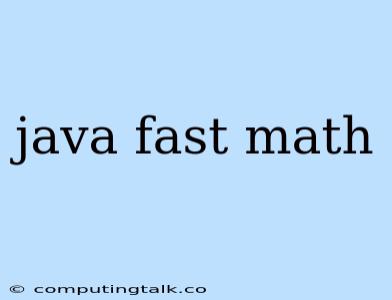Java is known for its versatility and performance, but sometimes, even the most optimized code can be slow. This is especially true when dealing with large datasets or computationally intensive tasks. In these scenarios, every millisecond counts, and even small optimizations can significantly impact performance. One area where Java developers can often squeeze out some extra speed is in mathematical calculations.
While Java's built-in Math class provides a wide range of mathematical functions, these functions are often designed for general-purpose use. For performance-critical applications, these functions may not be the most efficient. The java.lang.Math class provides basic mathematical operations such as sqrt, pow, sin, cos, tan and more. These functions are convenient for general-purpose use, but they might be slow in performance-critical applications. For these cases, java.lang.StrictMath class can be used. This class also provides basic math functions like java.lang.Math class but these functions are more precise. The functions of the java.lang.StrictMath class are generally slower than those of the java.lang.Math class.
Why Speed Matters in Java
Java's speed is crucial for many reasons. In a world of rapidly evolving technologies, users expect instant gratification. A slow application can frustrate users, leading to decreased engagement and potentially even lost customers. This is particularly true in today's fast-paced world where users are accustomed to high-speed internet connections and near-instantaneous responses.
Here are some specific scenarios where speed in Java is paramount:
- Game Development: Games rely heavily on real-time calculations. Slow math operations can lead to lag and stuttering, making the game unplayable.
- Scientific Simulations: Scientific simulations often involve complex mathematical models that require intensive calculations. Faster math operations allow for more realistic simulations and quicker results.
- Data Analysis: Analyzing large datasets often involves complex calculations. Faster math operations can significantly reduce processing time, allowing for faster insights and better decision-making.
- High-Frequency Trading: In high-frequency trading, every millisecond counts. Slow math operations can lead to missed opportunities and financial losses.
Understanding Java's Math Class
Java's Math class provides a set of static methods for performing common mathematical operations. These methods are convenient and generally sufficient for most applications. However, they might not be the most efficient for performance-critical scenarios. The Math class uses native methods to perform operations, and these methods can be optimized based on the underlying hardware architecture. But the performance of Math class methods can still be slow in some scenarios.
Let's delve into some specific examples:
Example 1: Calculating the Square Root
public class MathExample {
public static void main(String[] args) {
// Calculate the square root using Math.sqrt()
double num = 16;
double squareRoot = Math.sqrt(num);
System.out.println("Square root of " + num + " is: " + squareRoot);
}
}
Example 2: Calculating the Power
public class MathExample {
public static void main(String[] args) {
// Calculate the power using Math.pow()
double base = 2;
double exponent = 3;
double power = Math.pow(base, exponent);
System.out.println(base + " raised to the power of " + exponent + " is: " + power);
}
}
Example 3: Calculating Trigonometric Functions
public class MathExample {
public static void main(String[] args) {
// Calculate the sine of an angle using Math.sin()
double angle = Math.toRadians(30); // Convert degrees to radians
double sine = Math.sin(angle);
System.out.println("Sine of 30 degrees is: " + sine);
}
}
Techniques for Speeding Up Java Math
Here are some effective techniques to boost your Java math performance:
-
Use
StrictMathfor More Precise Calculations: WhileMathis designed for general use,StrictMathprioritizes accuracy and is ideal for scenarios requiring a high degree of precision. However, bear in mind thatStrictMathcan be slower thanMath. -
Utilize the
MathClass's Efficient Operations: TheMathclass already includes optimized methods for certain operations. For instance,Math.abs()(absolute value) is often faster than implementing your own logic. -
Leverage Bitwise Operations: For situations involving powers of two, bitwise operations like
<<(left shift) and>>(right shift) can be significantly faster than multiplication and division. -
Consider Pre-calculated Values: If you're using the same constants repeatedly, consider storing them in variables beforehand. This avoids repeated calculations and saves time.
-
Implement Custom Math Functions: For specific calculations, consider writing your own optimized functions. This allows you to tailor them to your exact needs and potentially achieve better performance.
-
Use Libraries: Libraries like Apache Commons Math provide a range of optimized mathematical functions and algorithms. These libraries have been thoroughly tested and optimized for speed and accuracy, saving you development time and effort.
Example: Implementing Fast Math Functions
public class FastMath {
// Fast square root approximation using the Babylonian method
public static double fastSqrt(double x) {
if (x < 0) {
throw new IllegalArgumentException("Cannot calculate square root of a negative number");
}
double guess = 1.0;
double previousGuess;
do {
previousGuess = guess;
guess = (guess + x / guess) / 2;
} while (Math.abs(guess - previousGuess) > 1e-6); // Adjust tolerance as needed
return guess;
}
}
Conclusion
Optimizing Java math performance is crucial for achieving high-performance applications. By utilizing techniques like using StrictMath, leveraging Math class optimizations, and considering custom functions, you can significantly reduce calculation times and improve the responsiveness and efficiency of your Java applications. Remember, choose the techniques that best suit your specific needs and prioritize those areas where performance is most critical.
